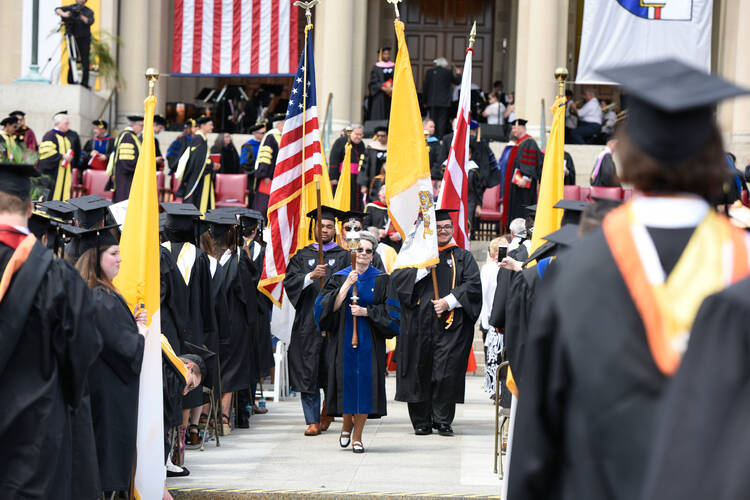Editor’s note: This is part of a series on faculty unions and Catholic higher education. For other perspectives, see the Short Take by Michael J. Garanzini, S.J., in our Oct. 17, 2017, issue, and the Short Take by Kevin Ahern and Ken Homan, S.J., published online on Jan. 13, 2020.
On Jan. 28, the U.S. Court of Appeals for the D.C. Circuit held that the National Labor Relations Board could not order religious colleges and universities to recognize adjunct faculty unions. The decision (Duquesne University of the Holy Spirit v. N.L.R.B.) is a welcome one at schools like my own, because it makes clear that our religious mission naturally extends to those who carry out its core function—teaching college students.
Many Western countries have no reservations about allowing faculty at state schools to engage in theological studies. Many religious schools in Europe receive government subsidies. Take Germany, for example. Pope Benedict XVI taught at public universities in Bonn, Münster, Tübingen and Regensburg. The U.S. Constitution, by contrast, frowns on public support for religious inquiries. We leave those matters to private schools.
The ruling makes clear that our religious mission naturally extends to those who carry out its core function—teaching college students.
The corollary to this arrangement (no public support) is that the government will leave private institutions alone in matters touching on faith (no regulation). The separation of church and state is above all a rule for keeping the state out of the church’s business. The government should be especially careful about meddling in relations between religious schools and their teachers. The Supreme Court has held that the federal Equal Employment Opportunity Commission cannot invoke employment discrimination laws to protect teachers in religious schools from being fired. And in 1979 it ruled that the N.L.R.B. cannot order collective bargaining in Catholic high schools.
The lower federal courts have applied this principle to collective bargaining in higher education as well. They have worried, rightly, that letting the N.L.R.B. supervise contract negotiations between universities and their faculties will entangle the government in the study, teaching and practice of religion. Justice Breyer put it bluntly when he sat on the First Circuit: “Congress did not contemplate that the Board would require church-operated schools to grant recognition to unions as bargaining agents for their teachers.”
The N.L.R.B. imagines that it can carve the universe of higher education neatly into secular and religious parts. This is a fairly cartoonish view.
For 40 years the Labor Board has paid little heed to these directions. In recent years it has been particularly insistent on charting its own course. For example, in 2014 it ordered a union election at Pacific Lutheran University for faculty not on the tenure track. In 2017, it claimed jurisdiction over adjunct faculty at Duquesne University. Unless they taught in the Theology Department, the N.L.R.B. held, they did not perform a sufficiently important role in maintaining Duquesne’s religious educational environment.
The N.L.R.B. (i.e., the government) imagines that it can carve the universe of higher education neatly into secular and religious parts. If it had its way, it would claim authority to oversee course loads, the manner of teaching, the teachers’ obligation to counsel students, and other terms and conditions of employment for all faculty, excepting only those specifically charged with “propagating religious tenets, or engaging in religious indoctrination or religious training.”
This is a fairly cartoonish view of the role that religion plays in higher education. It suggests that we learn about God through “indoctrination” in theology classes and “religious training” (perhaps with cold showers for the recalcitrant?). But what about Duquesne University’s biology classes? Francis Collins, the director of the National Institutes of Health and a former leader of the Human Genome Project, once observed that “I see DNA . . . as God’s language, and the elegance and complexity of our own bodies and the rest of nature as a reflection of God’s plan.”
What about Milton and Dante? Bach and Caravaggio? It is foolish to suggest that teaching a course on literature, music or painting is a purely secular undertaking. Duquesne has a law school. Does its sponsoring faith have nothing to say about the forms and limits of criminal punishment? About the justice of a progressive income tax? In teaching environmental law, may instructors observe, as Pope Frances does in “Laudato Si’,” that “The earth is the Lord’s” (Ps 24:1)?
The D.C. Circuit court rightly observed that sorting a university’s instruction into religious and secular piles “is no business of the State.” I hope this will put an end to the Labor Board’s efforts to govern faculty relations at religious schools. It is a fortunate quirk of labor law that every unfair labor practice decision by the Board can be appealed to the D.C. Circuit. So unless the Supreme Court (on which Justice Breyer now sits) decides to overturn Duquesne, this should be the end of the road for cases like this.











